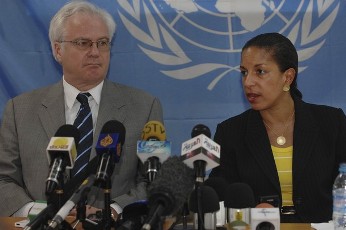World demands South Sudan pullout of Heglig, end to Khartoum’s air raids
April 12, 2012 (KHARTOUM) – A chorus of regional and international organisations reacted with concern on Thursday to heightened tension between Sudan and South Sudan following the latter’s takeover of the Heglig oil-area, urging Juba to withdraw troops and Khartoum to end aerial bombardment of South Sudanese territories.

South Sudan justified its occupation of Heglig, which officially lies in Sudan’s border state of South Kordofan, by saying it was responding to ground and aerial attacks launched by the Sudanese army inside southern territories.
Salva Kiir, the southern president, refused on Thursday to heed calls from the UN and AU to withdraw his troops while his Sudanese counterpart Omer Al-Bashir accused South Sudan of seeking war and vowed to retake the town.
In Addis Ababa, Ethiopia’s capital, the AU’s Peace and Security Council (AUPSC) held its 317th meeting on Thursday and received briefing on the military escalations along the borders between Sudan and South Sudan.
In an ensuing press release, the AUPSC expressed “deep concern” at the situation on the ground and strong disappointment over the failure of both sides to honor the agreements they signed during post-secession talks under the facilitation of AU mediators led by former South African President Thabo Mbeki.
The AUPSC also condemned in the strongest terms the actions taken by both sides over the last month, saying they “run contrary to all AU and international principles governing relations among sovereign states”.
The council has struck a tough tone on South Sudan, describing its takeover of Heglig as “illegal and unacceptable”, citing the fact that the town lies north of the agreed borderline of 1956 between the two countries.
It went on to demand the “immediate and unconditional” withdrawal of South Sudan’s army from the area.
Similarly, although less intoned, the council demanded that Sudan puts an end to its aerial bombardments in South Sudan.
The council also stressed that both sides should make every efforts to protect oil infrastructure in areas of conflict.
A continent away, meanwhile, the UN Security Council (UNSC) issued a strongly-worded statement in which it expressed deep alarm over the escalating situation and demanded that both sides refrain from hostile activities.
Susan Rice, the US envoy to the council and its rotating president, on Thursday read out a statement saying that the 15 member council “demands a complete, immediate, and unconditional end to all fighting; withdrawal of the SPLA [South Sudan’s army] from Heglig; end to SAF [Sudan’s army] aerial bombardments; end to repeated incidents of cross-border violence between Sudan and South Sudan; and an end to support by both sides to proxies in the other country,”
The council also demanded that both sides redeploy their troops “10 kilometers” outside the 1956 borderline as well as outside the hotly contested region of Abyei, which has been occupied by Sudan since May 2010.
Furthermore, the council urged the two countries to “immediately establish” a safe demilitarised border zone and stick to a deal they signed last year on joint border monitoring.
The council also called on Al-Bashir and Kiir to “meet immediately” in order to compensate for a summit they were supposed to hold on 3 April but was cancelled by Khartoum following earlier fighting around Heglig.
In a press conference held in Geneva Thursday, the UN’s secretary-general Ban Ki-moon echoed similar concerns and urged both government to cease hostilities immediately and arrange for a summit between Al-Bashir and Kiir.
Meanwhile, Sudan’s UN ambassador, Daffa-Alla Elhag Ali Osman, warned that his country would retaliate and strike deep into South Sudan if the latter does not comply with calls for withdrawal from Heglig.
“We in the government of Sudan, we will observe closely the behavior and attitude and the reaction of the government of the South for this call,” said Osman. “If they don’t heed it to this call, we will reserve our right to exercise the right of self-defense and we will chase them out; not only that, we will hit deep inside the south.”
His South Sudanese counterpart, Agnes Oswaha, told reporters in New York that her country supports UN calls for an end of fighting and was prepared to negotiate with Khartoum.
However, she said that Juba would not order a withdrawal from Heglig unless a mechanism was put in place to guarantee the area could not be used to launch further attacks against South Sudan” and a neutral international force was deployed to the area until the neighbours reached a settlement on the disputed territory.
In Brussels, the European Union has also condemned South Sudan’s capture of Heglig and Sudan’s aerial bombardment of southern territories.
“The move by the South Sudanese armed forces to occupy Heglig is completely unacceptable. So is continued aerial bombardment of South Sudanese territory by the Sudan Armed Forces,” a spokesman for the EU foreign policy chief Catherine Ashton said on Thursday.
The EU’s foreign policy chief called on both sides “to cease hostilities, withdraw forces immediately and stop support of armed groups in the territory of each other”.
(ST)
